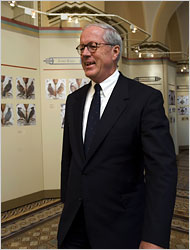While searching for articles and books on Giambattista Vico yesterday, I ran across a great 1997 interview with Lois Dupre from Christian Century on “Seeking Christian Interiority.” Dupre laments the loss of a metanarrative in this late modern world: “We experience culture as fragmented; we live on bits of meaning and lack the overall vision that holds them together in a whole.”
This “absence of a defining unity” cause us to feel “lost in a disconnected universe.” While some “postmodern” writers rejoice in the loss of an overall narrative, most of us struggle with the need for some meaning that brings coherence to our lives. Christendom offered such a coherence, but that integrated world died with the middle ages and the modern world has moved farther and farther from looking to Christianity as a source of integration.
Dupre suggests that as the awareness of what the modern project has realized, people struggle with a yearning for something from yesterday.
“They feel the fragments present to us must somehow be united in a manner that modern culture fails to accomplish. Hence they turn to models from the past. Some join ultraconservative religious or political movements, or they lose themselves in mystics of earlier times as if no cultural distance separated us from the past. Such complete reversals that attempt to abolish modern life are, I think, inauthentic ways for trying to achieve the integration our time needs.”
While we may have some nostalgia for the Christian past, Dupre warns against trying to “reinvent a Christian ‘tradition’ (mostly intended for the masses) for social or political purposes.” So how do we respond to the crying need for an integrated vision of the world?
In this world between worlds, Dupre finds inspiration from another time between times: the age of Augustine. The Classical world was ending and the Medieval world was beginning. Augustine finds personal integration through faith in Christ rooted in the Christian Community. This integration works outward and finds ways to synthesize the pieces of his fragmented world such as Roman civic morality and Neoplatonic philosophy.
Dupre sees this integration as working outward from personal to local to cultural. This is a slow process and in one sense comes to define the new world. I think we see a similar attempt in integration in the shift between the Medieval world and the Modern world in the Reformation and Renaissance.
As we find ourselves in a world between worlds again, Dupre offers humbled approach to transformation. Instead of triumphalist declarations of restoring Christendom, he suggests our best steps forward in for true personal integration based on faith rooted in the Christian community. We must begin with a deep and profound personal integration. This is simply an individualistic interpretation of Christian faith, but a an experiential Christian faith that springs from the Scripture and community of believers. It is deeply relational.
Working outward, we must learn and cultivate an inner integration of the pieces of the modern world. Instead of reaching backward, we trust the Providence of God and work from our current estate forward. Only then, can we begin to think about community and cultural transformation. More on that later.




